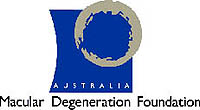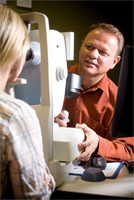Low GI Diet Good For Eye Health
Low GI Diet Good For Eye Health
Specsavers is urging Australians to consider making small changes to their shopping trolley in the lead up to Macular Degeneration Awareness Week, 26th May – 1st June.
Macular degeneration is the leading cause of blindness and vision loss in Australia. One in seven Australians over the age of 50, almost 1 million people, will show some evidence of macular degeneration andwithout prevention and treatment, this will rise 70% by 2030.
Peter Larsen, Specsavers Professional Services Director and practising optometrist, explains, 'Age, genes and lifestyle choices, such as diet and smoking, can increase the risk of macular degeneration. While you can't change your age or your genes, you can make changes to your lifestyle and diet that can help to reduce the threat of developing the condition."
In consultation with Nutrition Australia, Specsavers is encouraging Australians to include low GI foods in their diet, which is a simple way to help maintain healthy eyes.
Senior Nutritionist from Nutrition Australia, Aloysa Hourigan, advises, 'What we eat can make a difference to our eye health. To reduce your risk of macular degeneration, eat low GI foods to provide your body with more of the healthy omega 3 fats and the vitamins, minerals and other antioxidants that can help protect your eye health."
'Another simple change you can make to your diet is to add some colour to your plate with a range of different coloured vegetables," informs Mrs Hourigan.
Nutrition Australia recommends the following tips for maintaining healthy eyesight:
Aim for a diet that includes a good proportion of low GI foods e.g. wholegrains, many vegetables, fruit, nuts and legumes
Replace white bread and refined breakfast cereals with wholegrain varieties e.g. wholegrain breads, porridge or wheat biscuit cereals
Include a wide range of different coloured vegetables everyday – yellow, orange and red coloured vegetables are rich in the group of phytochemicals, known as carotenoids, which can help protect eye health
Include fish high in omega 3 (e.g. salmon, sardines, tuna, mackerel, herrings) 1-2 times per week. Other foods high in omega 3 include walnuts, almonds, and flaxseed
Limit the size of your red meat serves and limit your intake to 2-3 times per week
Peter Larsen advises that as well making these simple changes to your diet, regular eye checks are essential for maintaining eye health.
'Macular degeneration affects the centre of your sight and can result in blind spots, blurred or distorted vision and eventual blindness. This disease can go unnoticed for some time but symptoms include the inability to see fine details, difficulty driving and difficulty recognising people's faces.
'While making lifestyle and diet changes will greatly improve your eye health, it's still important to have a regular eye test every two years, as some serious eye conditions, like macular degeneration, do not always have obvious warning signs," said Mr Larsen.
Specsavers offers free Digital Retinal Photography with every standard eye exam to help combat and monitor macular degeneration and other harmful conditions. Digital Retinal Photography uses sophisticated equipment to produce a high-resolution photograph of the eye, allowing abnormalities to be detected, monitored and treated. Images are then stored by your optometrist to track your eye health over time.
Chickpea, Eggplant & Tomato SaladChickpea, Eggplant and Tomato Salad
Serves 4-6
Ingredients:
¼ cup extra virgin olive oil
500g lebanese eggplant, halved
2 cloves garlic crushed
1 teaspoon balsamic vinegar
1 teaspoon fresh basil
400g canned chickpeas, drained and rinsed
1 punnet cherry tomatoes halved
50g baby spinach leaves, washed
Method:
Heat half of the oil on a large frying pan and sauté the eggplant in batches for 2-3 minutes each side until golden and tender. Set aside and cool
Heat the remaining oil in the same pan on medium heat. Add the garlic and balsamic vinegar and reduce for a minute or so, shaking pan. Remove from heat, pour into a jug and cool. Stir in basil and season to taste
In a salad bowl, combine chickpeas with eggplant, tomato halves, spinach leaves and the cooled dressing. Season and serve
Oven-baked Fish with Roasted Vegetables and Lemon Mustard Dressing
Serves 4
Ingredients:
2 cups zucchini, cut into 1.5-2cm thick rounds
2 cups red onions, cut into wedges
3 tomatoes, cut into wedges
1/4 cup pitted black olives
1/4 cup (60ml) olive oil
4 x 120g fish fillet (e.g. mahi mahi, barramundi or salmon)
1 small garlic clove, crushed
1 tbs lemon juice
1 tbs dijon mustard
1/2 cup roughly chopped flat-leaf parsley
Method:
Toss the zucchini, onion, tomato and olives with 1 tablespoon of the oil in a baking dish. Brush another tablespoon of oil over the fish and place on the vegetables. Place in the oven and bake for 25-30 minutes until cooked through
Whisk together the garlic, lemon juice, mustard and remaining oil to make a dressing
Divide the cooked vegetables among plates and top each with a piece of salmon
Drizzle the fish with the dressing and scatter with chopped parsley
Recipes have been provided by Nutrition Australia and Healthy Food Healthy Planet
Specsavers offers high quality professional eyecare and includes free digital retinal photography with every standard eye test.
Specsavers is in partnership with The Fred Hollows Foundation, raising funds for its inspiring work in Australia and the Asia Pacific region. In addition, Specsavers advocates safe driving and works with Drive to Survive, one of Australia's leading post license driver training and development programs, to raise awareness of the importance of good vision.
Specsavers was founded by Doug and Dame Mary Perkins in 1984 and is now the largest privately owned optical retailer in the world and the second largest in Australia. The couple still actively run the company today, along with their three children. Specsavers has more than 1,500 stores in ten countries worldwide has 336 stores across Australia.
Have You Seen This?
MORE








